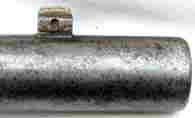|
Spencer Repeating Rifle & IT'S ENGLISH BAYONET
|
||||

LEFT SIDE VIEW OF THE SPENCER REPEATING RIFLE - SN 3981
|
||||
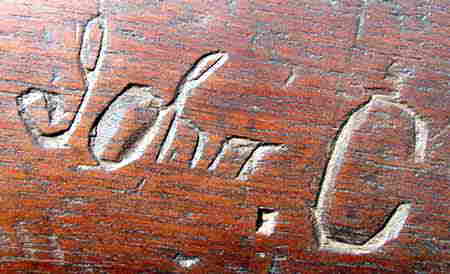
JOHN C's MARK
|
||||
|
I have had this Spencer rifle so long that I cannot remember from
whence it came. Like most war time issued Spencers, it saw hard
usage and exposure to the elements. It went through a war but
at least it came out in one piece. However, it didn't survive
the years with out any scars. It's missing the front sling swivel
and a previous owner liked it so much that he carved his name,
"JOHN C", in the left side of the stock, under the comb.
Whether this was done during or after the war is unknown. But
without doubt, this weapon was JOHN C's at one time or another.
It also came with a surprise, a perfect fitting bayonet of English
origin. When preparing for this week's posting, I went through
various reference books looking for a record of this rifle's serial
number - 3981. It was found that a Spencer rifle with serial
number 3980 was issued to Company K, 9th Michigan Cavalry.
It appears from the serial number ranges of the Spencers issued
to the 9th Michigan Cavalry that this rifle was very likely to
have been utilized by a trooper in the 9th Michigan Cavalry. They
twice bested the forces of General John Morgan CSA, went
with Sherman on the march from "Atlanta to the sea" and had the
prestige of being the first regiment of Sherman's army to reach
the coast. In a skirmish with General Johnson's forces at
Chapel Hill, N.C. just before news came of Lee's surrender and
the order to "cease firing", it is asserted that the Ninth fired
the last hostile shot of the war east of the Mississippi.
Could this be the rifle used?
|
||||

RIGHT SIDE VIEW OF THE SPENCER REPEATING RIFLE - SN 3981
|
||||
|
The introduction of the seven shot repeating Spencer rifle has
been called by some the turning point of the Civil War. This rifle
is caliber .52 rimfire utilizing the Spencer No. 56 straight copper
case which measured .56 at the top and bottom of the casing, hence
the oft times used designation of 56/56 cal. when referring to
the Spencer cartridge. It was the most powerful cartridge
used in any repeating rifle of the Civil War. The rifle
is 47 inches long and weighs approximately 10 pounds. It has 6
groove rifling and the front sight doubles as a lug for a socket
type bayonet. The Civil War Army model was manufactured
by Spencer Repeating Rifle Company, Boston, Massachusetts. 11,471
of these rifles were purchased by the government out of about
20, 000 manufactured. The government purchased models were
in the serial number ranges of approximately 700 to 11000 with
another small group in the 28000 range.
|
||||
|
|
||||
|
The faded case-hardened lock is 5-1/4" long. The curved hammer
was also case-hardened. The black walnut two-piece stock terminates
at a case-hardened fore-end cap 9/16" long that is 3-1/4" from
the muzzle. The butt stock measures 14-1/8" with a 9-1/4" comb.
The fore-stock has a length of 25-3/16". The once blued
barrel, now mottled, is 30" long. The front sight, which has a
pinned brass insert, doubles as a bayonet lug. It is 3/8" high,
3/8" long and 7/16" wide at the base. It is positioned 1-1/4"
from the muzzle. The single-leaf folding rear sight sits
on a curved spring base. The sight is 3-3/8" from the breech.
The iron barrel bands, springs and butt plates were originally
blued. The three 1/2" wide solid oval barrel bands are retained
by conventional springs under the stock. The middle band
once held the upper sling swivel which is now missing. The
lower sling swivel, 4" from the butt, is centered on a 1-5/8"
long screw held plate. The 14" tubular magazine fits into
a 7/8" diameter opening through the unmarked slightly curved butt
plate. There is an extracting handle on the magazine that covers
the opening. It turns counter clockwise toward the top of
the butt plate where it is secured by a button spring. The
only government inspector's marking on this rifle is "S. L." It
is on the left barrel flat near the breech. The initials are those
of Samuel Leonard - Armory Sub-Inspector, 1862-1875.
|
||||
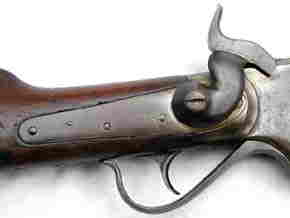
LOCK PLATE & HAMMER
|
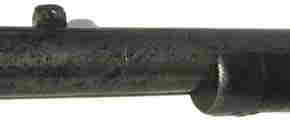
FORE-END CAP
|
|||
|
||||
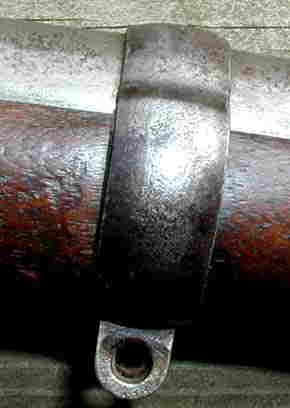
FRONT SLING SWIVEL BAND
|
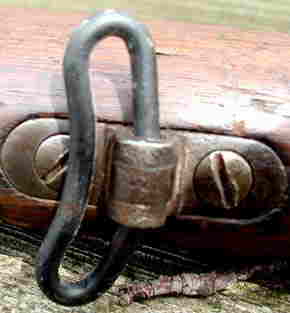
REAR SLING SWIVEL
|
|||
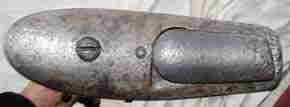
BUTT PLATE VIEW 1 (Magazine Tube In Place)
|
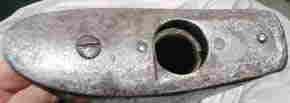
BUTT PLATE VIEW2 (Magazine Tube Removed)
|
|||
MAGAZINE LOADING TUBE
|
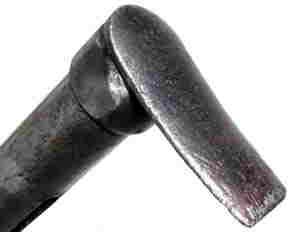
EXTRACTING HANDLE
|
|||
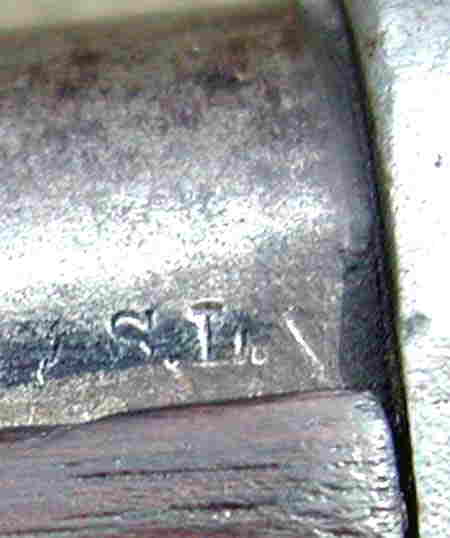
"S. L." INSPECTOR'S STAMPING - BARREL (Samuel Leonard -Armory Sub Inspector)
|
||||
|
|
||||
|
Between the breech and the barrel, the receiver is marked on the
top flat " SPENCER REPEATING - / RIFLE CO. BOSTON MASS .
/ PAT'D. MARCH 6 1860." in three lines. At the rear of the
breech, near the back of the hammer is the serial number "3981".
The tubular magazine/loading tube extends the full length of the
butt stock. The seven rimfire .52 caliber, 56/56 cartridges are
fed into the receiver through the pressure of a helical spring
secured to a rounded follower. The breech block is dropped, extracting
the fired cartridge cases, by pulling downward and forward on
the operating lever/trigger guard. This action also places the
next cartridge in the magazine into position. By lifting
the lever back into position the cartridge is driven into the
breech chamber for firing. The hammer must be manually cocked
before every shot. The action of the lever does not cock the hammer,
it only serves to eject the fired cartridge and to ready the next
one for firing. An expert marksman could get seven aimed shots
off in less than 10 seconds.
|
||||
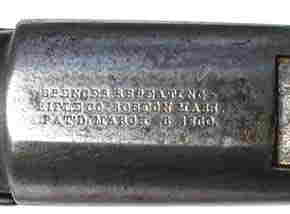
BREECH STAMPING |

CLOSE UP OF BREECH STAMPING |
|||
|
SPENCER
REPEATING -
|
||||

SERIAL NUMBER STAMPING - "3981"
|
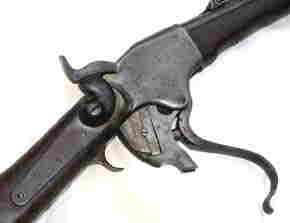
BREECH BLOCK - OPEN
|
|||
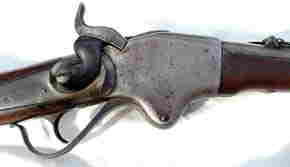
RIGHT SIDE VIEW OF BREECH
|
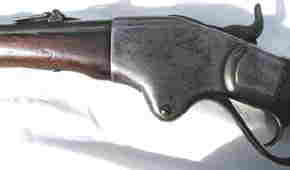
LEFT SIDE VIEW OF BREECH
|
|||
|
|
||||
|
As mentioned, this Spencer rifle came to me with an perfect fitting
bayonet. The surprising thing is that it is an English made socket
bayonet! It is undoubtedly a bayonet made for a large bore English
Enfield. But, it fits the Spencer like a glove. The inside diameter
of the bayonet throat is 1-27/32", a fraction under 1-7/8". It
mikes out at a little over .81 of an inch. The muzzle length is
1-3/16" and the lug channel is 9/32". The blade measures
17" from the shoulder to the point with a face flute of 15-1/2".
It is 31/32" wide at the shoulder. There is a stamped number of
"107" on the socket. The blade is marked with a "WD" over a crown,
over an "E", over a "1". The scabbard throat markings may be a
"6" over a "46" - hard to tell.
|
||||

OVER ALL VIEW OF BAYONET & SCABBARD
|
||||
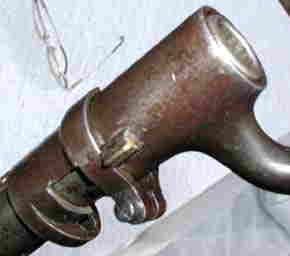 |
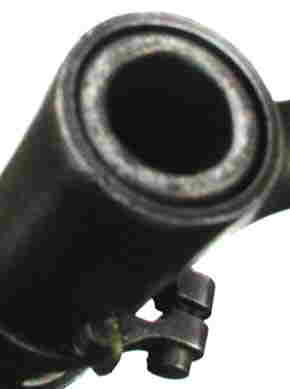 |
|||
| TWO
VIEWS OF BAYONET FIT
|
||||
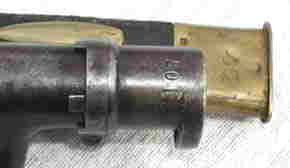
BAYONET & SCABBARD NUMBERS ("107" On Bayonet Socket - "6" Over "46" On Scabbard Throat)
|
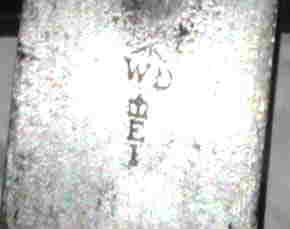
BLADE MARKING ("WD" Over Crown Over "E", Over "1")
|
|||
|
CLICK HERE http://www.civilwarguns.com/01beckpage.html
|
||||
|
|
||||
|
Credits for this week's posting go to FLAYDERMAN'S GUIDE TO
ANTIQUE AMERICAN FIREARMS... AND THEIR VALUES, by Norm Flayderman,
U.S. MILITARY SMALL ARMS 1816-1865 by Robert M. Reilly
and to SPRINGFIELD RESEARCH SERVICE -SERIAL NUMBERS OF U.S.
MARTIAL ARMS - VOLUME 4 - 1999EDITION by Springfield Research
Service, Silver Springs, Maryland and, of course, to my son and
webmaster, Reed Radcliffe of Sunset Hills, Missouri.
|
||||
|
Good night, "John C." wherever you are. I hope to be back to everybody
soon.
|
||||
|
Dave
Radcliffe
|
||||
